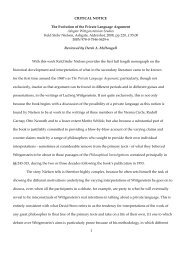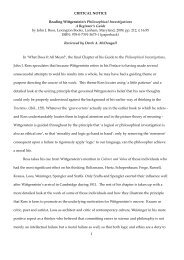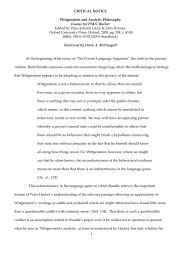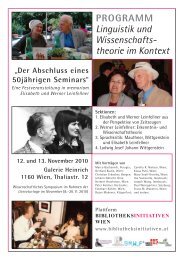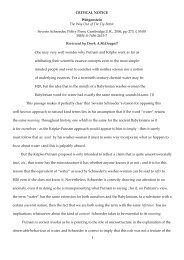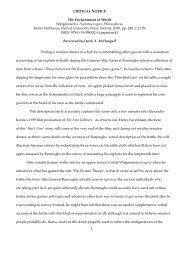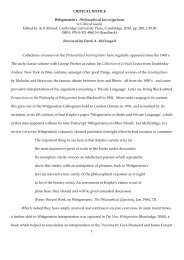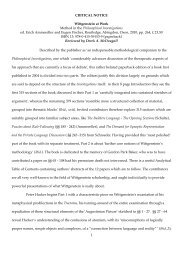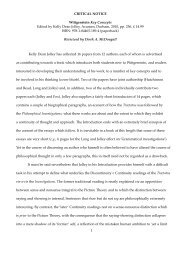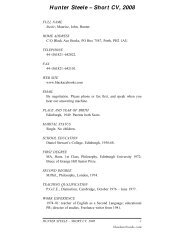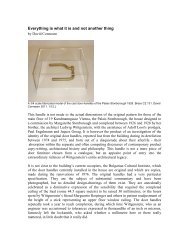Wittgenstein and Cambridge Family Resemblances
Wittgenstein and Cambridge Family Resemblances
Wittgenstein and Cambridge Family Resemblances
Create successful ePaper yourself
Turn your PDF publications into a flip-book with our unique Google optimized e-Paper software.
Russell to Ottoline Morell,<br />
18 October 1911<br />
He turned out to be a man who had learned engineering at Charlottenburg, but during his course<br />
had acquired, by himself, a passion for the philosophy of math’s, <strong>and</strong> has now come to <strong>Cambridge</strong><br />
on purpose to hear me.<br />
19 October 1911<br />
My German friend threatens to be an infliction, he came back with me after my lecture <strong>and</strong> argued<br />
till dinner-time – obstinate <strong>and</strong> perverse, but I think not stupid.<br />
1 November 1911<br />
My German engineer very argumentative <strong>and</strong> tiresome.<br />
2 November 1911<br />
My German engineer, I think is a fool. He thinks nothing empirical is knowable – I asked him to<br />
admit that there was not a rhinoceros in the room, but he wouldn’t.<br />
13 November 1911<br />
[M]y German ex-engineer, as usual, maintained his thesis that there is nothing in the world except<br />
asserted propositions, but at last I told him it was too large a theme […]<br />
16 November 1911<br />
My ferocious German came <strong>and</strong> argued at me after my lecture, […] He is armour-plated against all<br />
assaults of reasoning – it is really rather a waste of time talking with him.<br />
27 November 1911<br />
My German is hesitating between philosophy <strong>and</strong> aviation; he asked me today whether I thought he<br />
was utterly hopeless at philosophy, <strong>and</strong> I told him I didn’t know but I thought not.<br />
29 November 1911<br />
I am getting to like him, he is literary, very musical, pleasant-mannered (being an Austrian) <strong>and</strong> I<br />
think really intelligent.<br />
Russell in his Autobiography, 1959<br />
He was perhaps the most perfect example I have ever known of genius as traditionally conceived,<br />
passionate, profound, intense, <strong>and</strong> dominating.<br />
<strong>Wittgenstein</strong> to Russell, Skjolden,<br />
29 October 1913<br />
Identity is the very Devil <strong>and</strong> immensely important; very much more so than I thought. It hangs – like<br />
everything else – directly together with the most fundamental questions, especially with the questions<br />
concerning the occurrence of the same argument in different places of a function. I have all sorts of<br />
ideas for a solution of the problem but could not yet arrive at anything definite. However I don’t lose<br />
courage <strong>and</strong> go on thinking. –<br />
November 1913<br />
Lieber Russell!<br />
I intended to write this letter in German, but it struck me that I did not know whether to call you<br />
„Sie“ or „Du“ so I am reduced to my beastly English jargon! –<br />
In his answer Russell offered <strong>Wittgenstein</strong> to call him „Du“. The following letter <strong>Wittgenstein</strong> wrote<br />
already in German, Russell answered as always in English. This continued until <strong>Wittgenstein</strong> was taken<br />
prisoner in Italy after the Great War. From there he wrote in English, as well as his last two letters to<br />
Russell from 1935.



